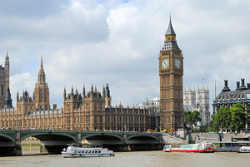Public Accounts Committee Blasts UK Superfast Broadband Rollout Again

The latest Public Accounts Committee report into the United Kingdom’s £1.2bn national Broadband Delivery UK project with BT, which aims to make fixed line superfast broadband (25Mbps+) speeds available to 95% of people in each local authority area by 2017, has once again poured heavy criticism upon the scheme for its alleged failings in competition and openness.
Last year’s controversial PAC report took exception to BDUK’s framework (here), which awarded all of the relevant contracts to BT (most of the time they’ve been the only viable bidder), and blamed the process for helping to prop up the incumbent operators “quasi-monopolistic position which it is exploiting by restricting access to cost and roll-out information.”
Advertisement
Since then some Local Authorities, such as Cumbria, have finally released more detailed roll-out maps (here) but the information is still very limited and some of the PAC’s original recommendations have not materialised (e.g. the demand for publication of 7-digit postcode level coverage data and full transparency of costs).
The coverage data is particularly important because without it many smaller ISP (altnet) schemes cannot get funding under the £20m Rural Community Broadband Fund (RCBF) due to the risk of overbuilding with the BT / BDUK project, which would contravene state aid rules. Officially councils have been told to publish the full data and BT has agreed (here) but requests for the relevant data by rival projects often appear to be shunned by local authorities (example).
So it’s perhaps unsurprising to find that the PAC’s latest report into the BDUK scheme is still quite scathing, albeit mercifully more focused on some of the core issues than earlier reports. But at times it can still read a little bit like an exercise in political point scoring.
Margaret Hodge MP, Chair of the PAC, said:
“The Government has failed to deliver meaningful competition in the procurement of its £1.2 billion rural broadband programme, leaving BT effectively in a monopoly position. The scheme is designed to help get broadband to areas, mainly rural, where commercial broadband infrastructure providers currently have no plans to invest.
Since our hearing in July last year, when 26 of the 44 contracts to deliver this were with BT, all remaining contracts have now also gone to BT. Despite our warnings last September, the Department for Culture, Media and Sport has allowed poor cost transparency and the lack of detailed broadband rollout plans to create conditions whereby alternative suppliers may be crowded out.
Whilst BT claims it is making further concessions, this is not impacting on rural communities. Local authorities are still contractually prevented from sharing information to see if they are securing best terms for the public money they spend. Communities can still not access the detailed data they need to understand whether they will be covered by BT’s scheme in their area. Other broadband providers might be squeezed out of the rural market by BT’s actions.
BT’s monopoly position should have been a red flag for the Department. But we see the lack of transparency on costs and BT’s insistence on non-disclosure agreements as symptomatic of BT’s exploiting its monopoly position to the detriment of the taxpayer, local authorities and those seeking to access high speed broadband in rural areas.”
The report then goes on to make a series of familiar recommendations and warns that a failure to make “significant progress” on them will result in execution by firing squad a “further hearing to find out why [DCMS] is not improving its approach to protecting public funds“, which in political circles is apparently what passes for a serious threat.
Advertisement
PAC Recommendations (April 2014 Report)
Recommendation 1: The Department should work urgently with all local authorities to publish detailed mapping of their implementation plans, enabling searches down to full (7-digit) postcode level. The information should include speed of service, as soon as that is available.
Recommendation 2: The Department should collect, analyse and publish costs data on deployment costs in the current programme, to inform its consideration of bids from suppliers under the next round of funding.
Recommendation 3: Before the next round of funding is released, the Department should work with local authorities to identify opportunities to promote competition and value for money; including considering alternative solutions, joint working and fair capital contributions from suppliers.
In fairness the issue of coverage data is often complicated by other factors, not least with the fact that the plan is constantly subject to change. For example, the original coverage target for Cornwall was 80% but as work progressed BT found that this could be lifted to 95% without incurring extra cost.
BTOpenreach’s engineers sometimes also need to remove areas from the plan if they run into significant / unexpected costs or other difficulties. On the other hand there’s really no reason why this should be a strict barrier and if an altnet secures an opportunity elsewhere then a dynamic project like this should be able to adapt (e.g. spend the BDUK cash to boost coverage in a different area).
Elsewhere recommendation no.3 is arguably a bit late because the next batch of £250m has already been allocated (here), although Local Authorities are only now beginning to submit their expressions of interest; so far all of them appear keen to simply extend their existing contracts with BT.
The Independent Networks Cooperative Association (INCA), which works to support altnet ISPs and the development of Next Generation Access networks around the United Kingdom, has naturally welcomed the PAC’s report.
Advertisement
INCA Statement
“INCA members agree wholeheartedly with the Public Accounts Committee’s latest report into the Rural Broadband Programme. There has been zero competition for the £1.2bn of public funding despite evidence that independent providers can often deliver better services, more cost-effectively than BT.
Government and local authorities must now take steps to ensure that there is genuine competition for the additional £250m (plus local match) of Superfast Extension Funding. Simply providing the additional the cash to BT is not a good option and is likely to lead to challenges under the state aid rules. This will result in further delays to a programme that is already two years behind schedule.
Government and local authorities must also make sure that alternative schemes, pulling in additional private sector and community funding, are supported not stymied. Allowing BT to use state funding to undermine competitors is not in the interests of rural communities, nor the UK as a whole.”
At the same time, while BT’s position will indeed benefit from public funding, it should not be forgotten that the outcome of BDUK is arguably a product of the current regulatory environment and there’s no quick fix for that.
As a result most rural areas, short of building completely new infrastructure at a huge cost (councils see this as a bigger risk than choosing BT with its big financial safety net), simply have no choice but to use BT’s underlying infrastructure.
Even if the regulation and BDUK rules were to change tomorrow then it would still take years before a big enough competitor emerged to do what BDUK can do today, across the whole of the UK, and with the same money / timescale.
A BT Spokesperson told ISPreview.co.uk:
“We respect the role of the committee but we feel their criticism of BT is inaccurate and unjustified. BT was the only company willing to accept the challenging terms on offer and make a significant investment in rural areas. This was at a time when others walked away when they realised easy pickings weren’t to be had. Claims that BT is a ‘monopoly’ are simply inaccurate given more than 100 ISPs are offering fibre across BT’s open network.
BT is delivering value for money and the National Audit Office acknowledged there are ‘robust’ processes in place to ensure that. DCMS and BDUK have full sight of BT’s costs so there is a very high level of transparency. Our solution was also cheaper and better than the bids submitted by our competitors – before they walked away – and those terms still apply. It is also the case we do not get paid until we have submitted detailed invoices showing the costs we have incurred.
As for maps, most councils have published coverage maps with our support. More detailed data will be released by them in due course once surveys have been completed and we know for sure that we are going to an area.”
It’s interesting to note BT’s final paragraph, which confirms recent reports that they’re still unwilling to publish all of the preliminary coverage data before the deployments have been confirmed. This means some areas could be left waiting for quite a while longer and perhaps unsurprisingly many of those are likely to be remote rural locations, where rival RCBF bids are being made.
On a more positive note it should be said that millions of people across the country stand to benefit from the BDUK scheme. It might have its flaws, perhaps far too many of them, but progress is progress and for such a small slice of public money (relatively speaking) it’s still better than being stuck on slow ADSL for years to come; although sadly some will continue to fall into that bracket even after 2017.
Mark is a professional technology writer, IT consultant and computer engineer from Dorset (England), he also founded ISPreview in 1999 and enjoys analysing the latest telecoms and broadband developments. Find me on X (Twitter), Mastodon, Facebook, BlueSky, Threads.net and Linkedin.
« UK PostOffice Tweaks its Broadband and Phone Prices






















































Comments are closed